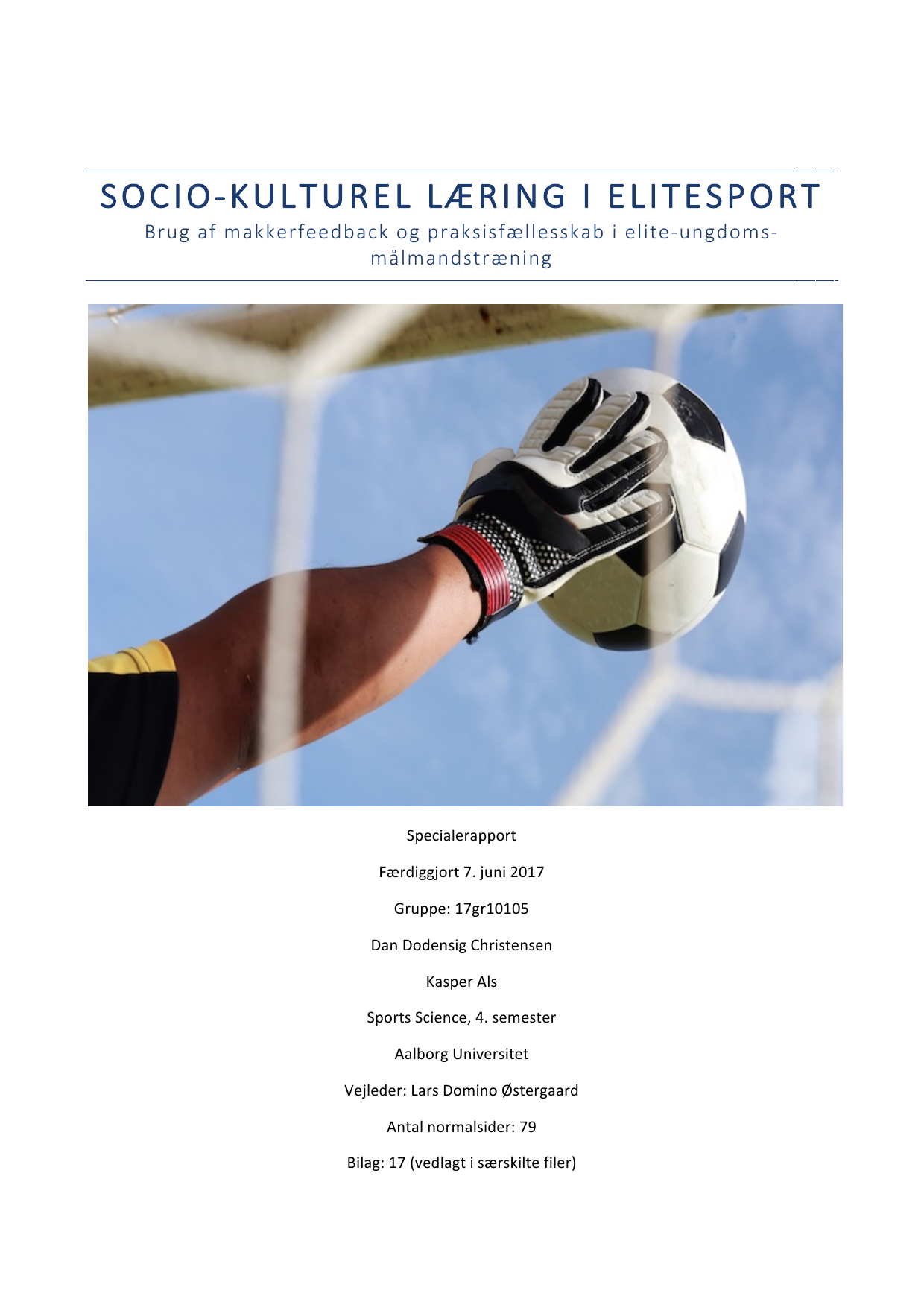
Socio-kulturel læring i elitesport - Brug af makkerfeedback og praksisfællesskab i elite-ungdomsmålmandstræning
Oversat titel
sociocultural learning in elitesport - The use of peerfeedback and communities of practice in elite youth goalkeeping pratice.
Forfattere
Semester
4. semester
Uddannelse
Udgivelsesår
2017
Afleveret
2017-06-06
Antal sider
98
Abstract
Aim : The aim of this thesis was to investigate how peer feedback and the Community of Practice theory (Wenger, 1998) can help elite-youth goalkeepers, in their handling of Critical Situations (Villemain & Hauw, 2014). Introduction : The modern goalkeeper has to be a versatile player (Mulqueen, 2010). And like most elite youth football players they are under a great deal of pressure to be selected for the lineup (Williams & Reilly, 2000). We started by interviewing Goalkeeping coach Kresten Vedstesen about the characteristics of goalkeeper training in Denmark. He told us that it is characterized by being very technical and without any drills that stimulate the goalkeeper’s decision-making abilities (Bilag 4, L: 110-120). In general, it is conducted in a deductive way, where the goalkeepers were told exactly what to do, by their coach (Bilag 4, L: 178-180). We therefore find it necessary to use a holistic training approach which include both the technical, tactical and mental aspects of the goal keeper performance. Villemain & Hauw (2014) found that goalkeepers often struggle with handling four Critical Situations: “coming off the line, goal-line clearances, one-on-one, and diving” (Villemain & Hauw, 2014: p. 816). In order to practice the Critical Situations, we aimed at creating a holistic training on the basis of enabling game situations, in order to stimulate the goalkeeper’s information processing and decision making (Ibid.). Studies have shown that greater autonomy in the training, stimulates decision making competencies (Kaya, 2014; Dyson et al., 2004). Further Holt et al. (2012) shoved that peer feedback in youth elite football have a positive effect on transferring skills from practice to match. Peer feedback is student centered approach to learning, where pairs guide each other through formative feedback (Liu & Carless, 2006). Studies have shown that through peer feedback students are more motivated to participate in PE (Østergaard & Curth, 2014), are more critical about the subject (Orsmond et al., 2000) and that there is a strong relationship between the peer feedback students provided for others and the quality of their own final project (Li et al., 2010). The Community of Practice theory is a socio-cultural theory of learning, which is centered around mutual engagement, joint enterprise and shared repertoire (Wenger, 1998). Although this theory has been widely used to understand learning in PE, it is rarely used in an elite sports setting (Christensen et al., 2010; Culver & Trudel, 2008). We used the Community of Practice theory in order to understand how football skill is learned through relations on an elite-youth Danish football team (Christensen et al., 2010). Method : We conducted a case study consisting of a training intervention with four Danish male youth elite goalkeepers, two U17 and two U19. The intervention consisted of six 30-minute sessions. Six forwards from the U17 team were part of two of the sessions, where they gave the goalkeepers feedback in order to stimulate game-intelligence and meet the demand of making the training set in a team centered and holistic manner. The analysis was based on qualitative data consisting mainly of two group interviews with the goalkeeper pairs conducted after the intervention (Kvale & Brinkmann, 2009), supported by player-logbooks filled after each session (Hettich, 1990) and video observation conducted in each of the sessions (Ottesen, 2013). We used a thematic analysis, with data driven coding used to derive the themes, which was discussed in the light of relevant research (Braun & Clarke, 2006). The study was founded in a hermeneutic-phenomenology approach with a socio-cultural ontology (Dysthe et al., 2003). Results & Conclusion : We conclude that the use of peer-feedback and the community of practice theory can take part in stimulating elite goalkeepers handling of Critical Situations. This is partly from an increased mental awareness in training and increased articulation of their knowledge and observations. The data indicated that the goalkeepers were mostly focused on the tactically aspects of the game, with an emphasis on the technically aspect being more intuitive, which could be a challenge to the learning outcome. By giving the goalkeepers the responsibility for each other’s development, they increased their mutual engagement. We further conclude that by receiving peer feedback from forwards, they increased their handling of Critical Situations, which could be through a stimulation of their game intelligence. But there was also an element of resistance to the feedback from forwards. This puts emphasis on the role of the trainer in a more autonomic structured training. He should be both a facilitator of the session, but also a translator/broker between two very different ways of understanding football. Finally, the results indicate that the goalkeepers hat difficulties in identifying there learning outcome of the intervention. But their trainer stated that their communication skills had improved. This could be a way of improving their handling of Critical Situations through improved collaboration with team members.
Emneord
